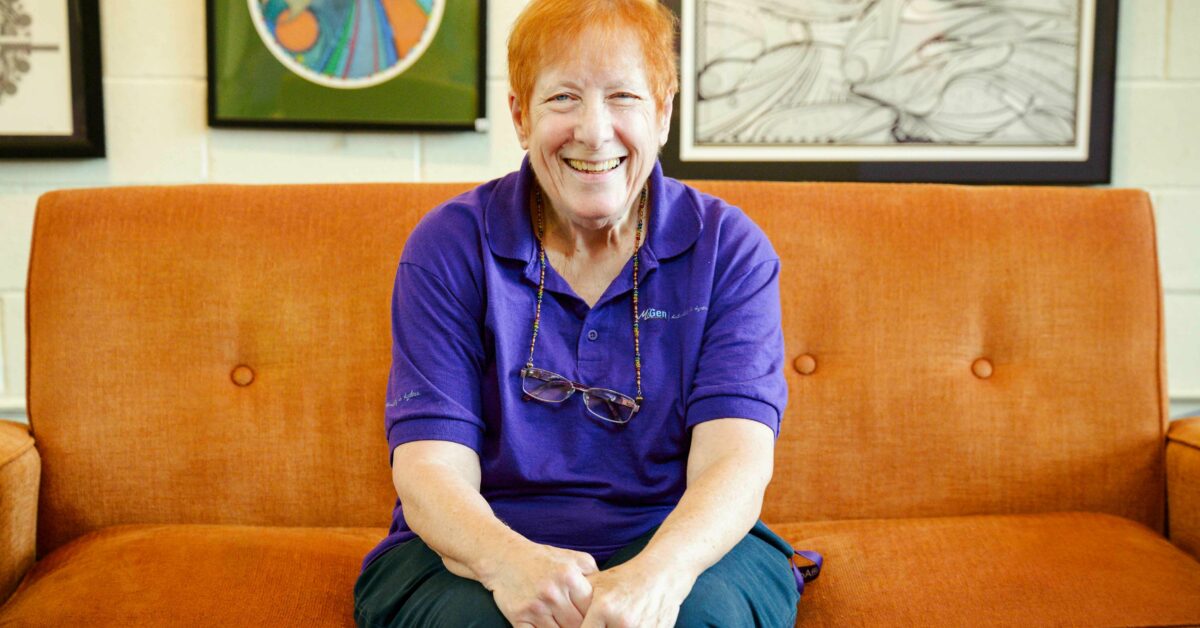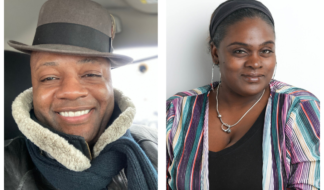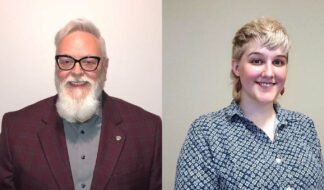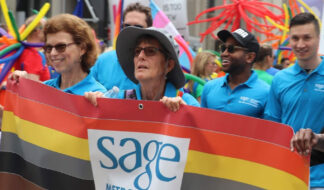Why LGBTQ+ Advocate Judy Lewis Has Dedicated Her Career to Helping Michigan's Older LGBTQ+ Community
Lewis' negative personal interaction with local medical facility fuels her continued commitment

This article is part of the News is Out “Out and Aging” series, made possible with support from AARP.
Longtime queer community advocate and all-around rockstar servant of the people Judy Lewis isn’t sure why we’d want to interview her, but she’s happy to accommodate our request. “I’m here for whatever you need,” she says. It’s a phrase that could be a guiding principle for a career that has seen Lewis jumping in to help people who’ve needed her for decades. She’s just wired that way — “efficient, competent, trustworthy (and one of the funniest people I know),” says one longtime community partner, Pride Source Publisher Emeritus Jan Stevenson.
In part, it was Lewis’ personal perspective that led her down a path toward co-founding and serving in her current role as lead training and tabling manager for MiGen, the agency formerly known as SAGE Metro Detroit that focuses on LGBTQ+ advocacy for community members 45 and up. “I had pneumonia, and I was at one of the hospitals locally,” she recalls of an experience that happened around 40 years ago. “And the nurse must have recognized that the woman who brought me was my partner or a more ‘intimate friend,’ and she was not happy…”
The story Lewis recounts about the experience won’t be unfamiliar to older members of the LGBTQ+ community.
“I was taken in a wheelchair for an X-ray, and this woman turned the chair to face the wall, where the people in line waiting for their X-rays could see me. And all I could think about at that point, because I was just terrified, was not having enough air, somehow. And wondering, ‘What are they gonna do to me?’ I kept thinking, ‘Just breathe into your nose and out through your mouth and don’t cry or, or you’ll die.’” At the time, Lewis’ daughter was only a few years old.
Recently, Lewis visited the same hospital under dramatically different circumstances when she delivered a presentation to the facility’s geriatric physicians and fellows. “I told that story, and they said that would never happen now,” she says with a smile. Today, the hospital has a diversity group and a task force focused on inclusion. Lewis made sure to confirm that “diversity” at the facility includes the LGBTQ+ community. It’s important to clarify that it wasn’t too long ago, Lewis says, that emergency workers could legally refuse to carry LGBTQ+ patients in their ambulances. “EMS could stop and let you out,” she remembers. “And you were not protected.”
Today, Lewis and MiGen help deliver a wealth of services to Michigan’s 45+older adult LGBTQ+ community, from helping clients overcome issues like food insecurity to connecting them to social groups, tech help, medical resources, transportation and more. The organization is a co-sponsor of the Raymond E. Shepherd House, an LGBTQ+-affirming affordable housing project for older adults currently under construction in Ferndale.
MiGen Executive Director Angela Gabridge says Lewis has been a “consistent drumbeat in the need for this work and has worked with Area Agencies on Aging, long term care providers and others across Michigan for many years to provide culturally responsive training that improves the lives and care of LGBTQ+ older adults.”
Prior to co-founding MiGen, Lewis worked in various leadership roles at local LGBTQ+ organizations, including as the executive director of the Jewish Gay Network of Michigan from 2009 to 2011. It was there that she realized how little attention was being paid to older community members when it came to services and advocacy. She reached out to fellow community organizer Jay Kaplan and asked him to connect her with community professionals who might welcome programming focused on older LGBTQ+ adults. “And his response was, ‘Not only don’t I know anyone I can direct you to, but let me tell you some horrible stories…’”
When Lewis first contacted Kaplan, who now serves as an attorney for the Michigan ACLU’s LGBTQ+ Project, he recalls that there was no identifiable program within the LGBTQ+ community that addressed the issues and challenges facing older adults, let alone one with the required cultural competency to be effective. “I’d heard stories about long-term partners of same-sex couples evicted from their homes by their partner’s family after the partner had died and of families not permitting same-sex partners to visit loved ones at nursing home facilities,” he says. “I also heard about adult foster care programs prohibiting transgender residents from being able to present themselves in accordance with their gender identity.”
Social opportunities for older LGBTQ+ adults were sorely lacking, as well, Kaplan says. “There was nothing in 2010 — no LGBTQ+ organizations that I was aware of at the time offering any program that provided opportunities for socialization and visibility in the community.”
Lewis began to hear about trans folks having their clothing taken away and queer people being subjected to conversion therapy tactics in their living communities. Local advocacy groups like Affirmations reported that longtime clients frequently requested their names be taken off mailing lists so they wouldn’t be outed to staff or fellow residents at their assisted living facilities. “They’d move to these places and decide that from now on, they are no longer going to see their friends because they don’t want guilt by association,” she says. “They’re afraid of what workmen might do if they came into their places and saw something that appeared gay.”
It’s a situation that still happens today, but much less frequently, thanks in big part to the kind of advocacy Lewis has spent years cultivating alongside other local community leaders, developing training and education programs for companies and organizations large and small. “We would talk to them about how to come out as an ally to your constituents, your clients, patients, participants and so on and, and it grew from there,” she remembers.
“It’s been quite a journey because now we cover sexual orientation, gender identity and expression, but the work is really the same — we’re working to change the culture and to change the hearts of people.”
Looking ahead, MiGen is partnering with the Michigan Department of Health and Human Services on a program focused on expanding care and housing options and reducing abuse and neglect in the older adult community throughout the state. However, Gabridge says, forward momentum has stalled in at least one area due to language in the multi-year plan centered on diversity, equity and inclusion and providing responsive care to the LGBTQ+ community. The Delta County Senior Commission, based in the UP, voted down the plan because of this language. Gabridge and MiGen are working to reach community members who need services in that part of the state and other rural communities.
Lewis acknowledges that legal achievements like the recent LGBTQ+-discrimination amendment to Michigan’s Elliott-Larsen Civil Rights Act are critical for the safety of the LGBTQ+ community but adds that legislative success doesn’t always match the reality of everyday life for people experiencing discrimination. “I go back to the Civil Rights Act from 1965 and ask how that’s going for us,” she laments. “We’re not done here.”
This content is made possible through our partnership with AARP. Partnerships like these enable Pride Source to produce free, quality storytelling for the LGBTQ+ community.










